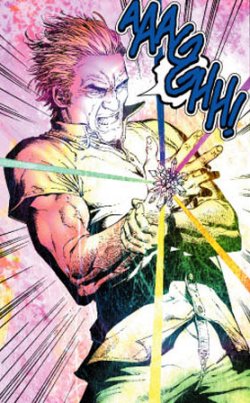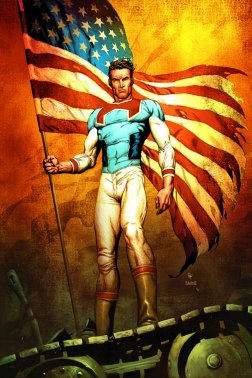| Supreme
Power: Contact
We've
come to the point in superhero comics that originality is
rare, not for a lack of talent or creativity, but simply because
the superhero genre has been tackled from almost every perspective.
These multiple plot slants can range from straight superheroic
storytelling (Superman), crime/noir (Batman,
Greyshirt, Top 10), abstract (Madman), humor (Formerly
Known As The Justice League), etc.
The difficulty
in creating anything truly new drives many writers to simply
take an old idea and look at it in a new light. Warren Ellis
does this all the time in Planetary; he takes superhero
canon and changes or updates the material. Everyone from The
Hulk to Doc Savage has had a version of him or herself tweaked
by Ellis, usually twisted into being almost unidentifiable.
The point
being that, while it sounds like a hack writing technique
to rehash old characters and plotlines, it actually takes
a hefty amount of talent to make the old seem new again, or
the familiar not seem repetitive.
Supreme
Power is J. Michael Straczynski's imagining of the origins
of the Squadron Supreme: a team of superheroes, (a thinly
veiled version of DC's Justice League of America, which in
turn echoes the original Justice Society of America) that
originally appeared as foes of Marvel's Avengers). When this
series was launched, Marvel re-released a previous twelve
issue maxi-series Squadron Supreme in a large collection
with a new cover by Alex Ross. Have no worries if you have
yet to read the original work by Mark Gruenwald, because Straczynski's
Supreme Power bears only a passing resemblance.
A middle-aged
couple is driving through the heartland of America when an
alien ship crashes into a cornfield. Upon investigation, they
find an infant inside, and the couple decides to take him
home and raise him as their own. Sound familiar? About twenty
minutes after they get the little bugger home, a special ops
team is knocking on the door and removing the "subject"
from their care. The similarities to the Superman mythos end
right about there.
Straczynski
does the best job I've ever seen in bringing the idea of the
superhero into the real world, and more importantly, the modern
world. The child is taken by and becomes a ward of the United
States government, under President Carter's administration,
and the questions of what to do with him start popping up.
From his DNA, skin density, and abnormal level of strength,
they know he is extraterrestrial. The government knows that
this child, referred to as Project Hyperion, will become a
massively powerful asset to the United States if he is raised
with just the correct mix of propaganda and nationalistic
pride, so they design a long-term plan to raise the perfect
American. And it works.
Something
that Straczynski does throughout the book, especially in scenes
involving the government and Project Hyperion, is take out
any great moral delineation. Some writers would be tempted,
when writing about a government that covers up a secret agenda,
to demonize the government, military, and research scientists
involved with the project. Straczynski keeps the reading in
a morally ambiguous zone, where the reader can look at every
character objectively. The research scientists and personnel
involved with Project Hyperion are not some shadow cabal or
divergent branch of the American bureaucracy, but our own
government dealing with a situation that has no base of reference.
While
it might be considered somewhat black-hat to create a false
home environment to influence the growing mind of a child,
the reasoning behind the action is explained in a very logical
manner by Straczynski, much of which has to do with the safety
of the nation. The CIA operatives chosen to become Mark Milton's
(Hyperion's) parents, while they don't love but rather fear
their adopted son, still treat him as a son. The father listens
to Mark when he's having problems, especially as Mark deals
with his growing number of powers. The mother performs her
Donna Reed-like role perfectly, and it is never alluded to
that they resent either Mark or the situation they are in.
It makes the graphic novel far more complex and far more enjoyable
when the reader is challenged to define the ethics of the
characters, without being spoon-fed the author's own perceptions.
Also of
note is the way Straczynski updates and introduces the audience
to the rest of the future Squadron Supreme. The Blur, a super-speedster,
entering the national stage as an opportunistic spokesperson
for several companies, was an interesting twist, as well as
was the militaristic background of Joe "The Doctor"
Ledger (who will become Dr. Spectrum, a Green Lantern type).
The vigilante Nighthawk takes the revenge psychosis to a higher
level than the Dark Knight himself, and Straczynski places
a few hints as to which Squadron members will show up in further
volumes.
 |
The artwork
is great and the way the narrative flows so well with the
artwork attests to the fact that penciler Gary Frank and Straczynski
have worked together before, on Midnight Nation. Frank
is an all-around good artist: he has detail in facial expression,
body movement, and structural aspects. He paces his panels
appropriately to the text and narrative, and uses several
different perspectives to frame a scene. My only problem with
his art, which may be a result of the inking done by John
Sibal, is that there appears to be a glut of skin creases
and facial lines on some of the characters, no matter what
their age happens to be. It's a small thing that I've found
that bugs me (Frank Quitely does it all the time), but doesn't
detract from my like of a book.
Supreme
Power: Contact is a great beginning to what promises to
be a great series, not to mention another valid superhero
deconstruction (or are we at the point where we'd have to
start reconstructing those spandex/leather-clad do-gooders?).
The strength of the story is that it is not about being a
superhero, but superhuman in world completely unfamiliar to
the concept. Straczynski worries about the character first,
and avoids the pitfall of having the power define the man,
and he posits a logical reaction for the whole of society
as it confronts super-humanity. I love seeing something like
this come out of Marvel, which is the company I have always
consigned to producing the less affecting stories and characters.
It goes
to show that cynical college students can still be surprised.
At $14.99,
you get a story with a lot of depth for a little price.
Supreme
Power
|







